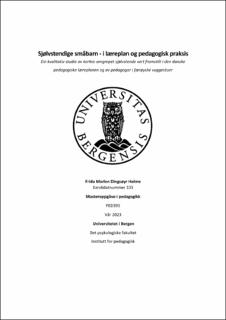Sjølvstendige småbarn - i læreplan og pedagogisk praksis
Master thesis
Permanent lenke
https://hdl.handle.net/11250/3070609Utgivelsesdato
2023-05-15Metadata
Vis full innførselSamlinger
- Master theses [55]
Sammendrag
Eit heilt sentralt ideal i den færøyske kulturen er å vere individualist, og på samfunnsnivå ser ein ei utvikling frå kollektive til individuelle verdiprioriteringar som legg eit aukande press på enkeltmenneske sitt sjølvstende. Denne masteroppgåva fokuserer på den barnehagefaglege og profesjonelle forståinga av omgrepet sjølvstende som leggast til grunn for offentleg oppseding. Problemstillinga for oppgåva er: korleis vert sjølvstende framstilt i den danske pedagogiske læreplanen og av færøyske pedagogar? For å svare på problemstillinga ser ein på kva som kjenneteiknar det sjølvstendige barnet, og korleis arbeidet med å utvikle sjølvstendige barn vert forklart i læreplanen og av pedagogar. Det er gjennomført ei tematisk analyse av fem intervju med færøyske pedagogar, samt relevante delar av den danske pedagogiske læreplanen. Oppgåva er forankra i eit sosialkonstruktivistisk vitskapsteoretisk perspektiv, og det teoretiske rammeverket er basert på teori som symboliserer ulike diskursar i samfunnet knytt til tema sjølvstende. Ein kan sjå desse diskursane i samanheng på tre ulike nivå; det medverkande barnet i vesten på eit metanivå, mål for utdanninga på eit systemnivå og sjølvforvaltning som pedagogisk praksis på eit individnivå. Funna tyder på at sjølvstende vert forstått som ein del av barn si naturlege utvikling og at arbeidet med sjølvstende hjå småbarn vert legitimert i at barna utviklar eit sjølvverd. Både læreplan og pedagogar ser sjølvstende som ei form for kvalifisering, sosialisering og subjektivering. På grunnlag av den tematiske analysen som er gjort er det identifisert to ideal for sjølvstende. Det første idealet, det autonome barnet, seier noko om pedagogane sin respekt for barn sin autonomi, korleis det er ein del av ei fagleg profesjonalisering og at dette er eit ideal i vestleg barneoppseding. Det andre idealet, den demokratiske borgaren, seier noko om demokrati og medborgarskap som ideal i barnehagen. I læreplanen vert det sjølvstendige barnet fremja som eit steg på vegen mot idealet om den demokratiske borgaren. Utsegna til læreplanen og pedagogane vitnar om ei konvensjonell forståing av barndom der sjølvstende og autonomi vert sett på som utviklingsmessige endepunkt. Spørsmålet om kvifor ein skal arbeide med sjølvstende hjå småbarn botnar i pedagogiske grunnlagsproblem som individualisme versus kommunitarisme, om barn si utvikling er noko naturalistisk eller kulturelt og spørsmål om barn sine behov versus kompetansar. A central ideal in the Faroese culture is to be an individualist, and on the societal level one sees a development from collective to individual value priorities which puts an increasing pressure on the individual’s autonomy. This master’s thesis focuses on the nursery specialist’s, professional understanding of the concept of independence which forms the foundation for public education. The research question for this thesis is: How is independence portrayed in the Danish educational curriculum and by Faroese educators? To answer the research question, the thesis will examine what characterizes the independent child and how the development of independent children is explained in the curriculum and by educators. A thematic analysis has been conducted of five interviews with Faroese educators, as well as relevant parts of the strengthened pedagogical curriculum. The thesis is anchored in a social constructivist knowledge theory perspective, and the theoretical framework is based on theories that symbolizes various discourses in society related to the theme of independence. One can see these discourses in the context of three different levels: the participating child in the West at a meta-level, goals for education at a system-level and selfmanagement as educational practice at an individual level. The findings suggest that autonomy is understood as part of children’s natural development, and that work with independence in young children is legitimized by the idea that the children develop a self-worth. Both the curriculum and the educators see independence as a form of qualification, socialization, and subjectification. Based on the before mentioned thematic analysis, two ideals of independence have been identified. The first ideal, the autonomous child, speaks to the educator’s respect for children’s autonomy, how it is part of professionalization and that this is an ideal in Western child-rearing. The second ideal, the democratic citizen, speaks to democracy and citizenship as an ideal in the kindergarten. In the curriculum, the independent child is promoted as a step towards the ideal of the democratic citizen. The statement of the curriculum and educators testify to a conventional understanding of a childhood where independence and autonomy are seen as a developmental endpoint. The question of why one should work with independence in young children is rooted in pedagogical foundational problems such as individualism versus communitarianism, whether children’s development is naturalistic or cultural, and questions about children’s needs versus children’s competencies.
